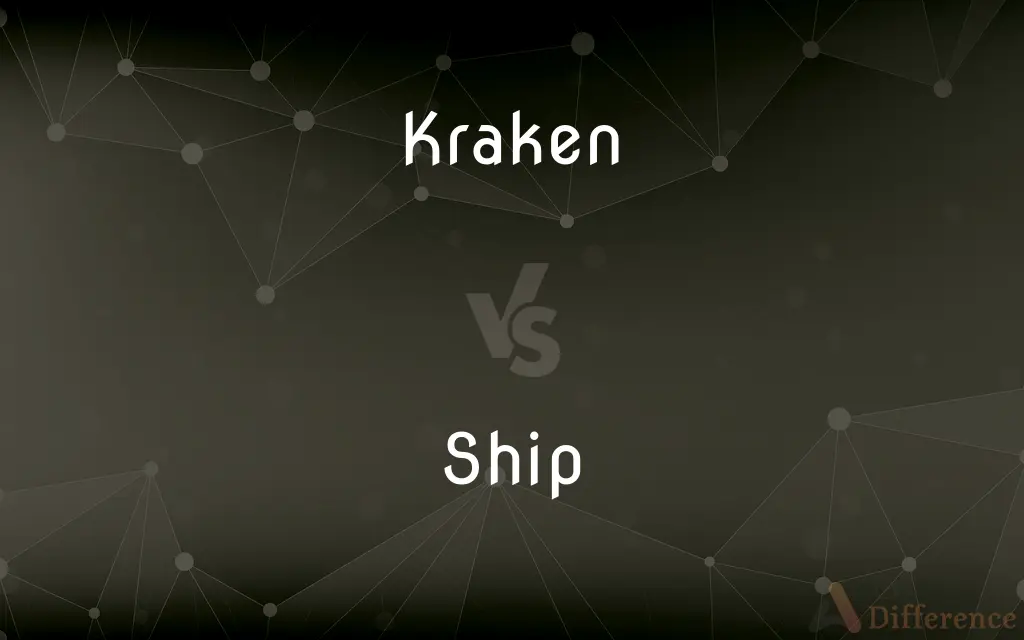Kraken vs. Ship — What's the Difference?
By Tayyaba Rehman & Fiza Rafique — Updated on April 8, 2024
The Kraken is a legendary sea monster of gigantic size, said to dwell off the coasts of Norway and Greenland, while a ship is a large watercraft designed for maritime travel or transport.

Difference Between Kraken and Ship
Table of Contents
ADVERTISEMENT
Key Differences
The Kraken is a mythical creature often depicted in folklore and literature as a giant octopus or squid, capable of sinking ships and terrorizing sailors. In contrast, ships are human-made vessels, constructed to navigate and survive the ocean's challenges, serving purposes like transportation, exploration, and warfare.
While the Kraken represents a force of nature or supernatural entity that embodies the mysteries and fears of the ocean, a ship symbolizes human ingenuity, exploration, and the desire to conquer and understand the sea. The contrast between the two highlights humanity's ongoing struggle against natural and mythical forces.
Ships vary widely in size, design, and function, ranging from small fishing boats to massive cargo carriers and naval vessels. Meanwhile, the Kraken is consistently described as an enormous beast, suggesting a singular, overwhelming threat as opposed to the diverse and adaptable nature of ships.
The concept of the Kraken may have originated from sightings of real but exaggerated sea creatures, like giant squids, by ancient sailors. On the other hand, the development of ships is a documented part of human history, reflecting technological advancement and changing societal needs over centuries.
Stories involving the Kraken often serve as cautionary tales or metaphors for the unknown and uncontrollable elements of nature, while the stories of ships are usually about human adventure, discovery, and the triumphs and tragedies of maritime life. This distinction underscores the difference between mythical interpretation of the sea's dangers and the real-life challenges faced by mariners.
ADVERTISEMENT
Comparison Chart
Nature
Mythical sea monster
Human-made watercraft
Representation
Natural or supernatural danger
Human ingenuity and exploration
Size and Form
Gigantic, often depicted as a giant octopus
Varies, designed for specific maritime purposes
Origin
Folklore and mythology
Technological and societal development
Symbolism
Mystery, fear, and the uncontrollable
Adventure, conquest, and human endeavor
Compare with Definitions
Kraken
Supernatural Power.
The Kraken was believed to create whirlpools to sink ships.
Ship
Versatile Design.
The ship was equipped with sails and oars, designed for both speed and maneuverability.
Kraken
Maritime Mystery.
The Kraken remains one of the sea's enduring mysteries, a creature of myth and legend.
Ship
Human Craftsmanship.
Master craftsmen labored for years to construct the majestic ship.
Kraken
Gigantic Size.
Legends describe the Kraken as large enough to encircle a ship with its tentacles.
Ship
Symbol of Exploration.
The ship carried explorers to the farthest reaches of the known world.
Kraken
Mythical Beast.
Sailors once feared the Kraken would emerge to drag their vessel into the deep.
Ship
Maritime Vessel.
The ship set sail at dawn, embarking on a journey across the vast ocean.
Kraken
Symbol of Dread.
The tale of the Kraken served as a warning of the perils lurking in uncharted waters.
Ship
Survivor of the Seas.
Despite facing fierce storms, the ship remained steadfast, a testament to human resilience.
Kraken
The kraken () is a legendary sea monster of gigantic size and cephalopod-like appearance in Scandinavian folklore. According to the Norse sagas, the kraken dwells off the coasts of Norway and Greenland and terrorizes nearby sailors.
Ship
A ship is a large watercraft that travels the world's oceans and other sufficiently deep waterways, carrying goods or passengers, or in support of specialized missions, such as defense, research, and fishing. Ships are generally distinguished from boats, based on size, shape, load capacity, and tradition.
Kraken
An enormous mythical sea monster said to appear off the coast of Norway.
Ship
A vessel of considerable size for deep-water navigation.
Kraken
A huge sea monster in Norwegian legend.
Ship
A sailing vessel having three or more square-rigged masts.
Kraken
A fabulous Scandinavian sea monster, often represented as resembling an island, but sometimes as resembling an immense octopus.
To believe all that has been said of the sea serpent or kraken, would be credulity; to reject the possibility of their existence, would be presumption.
Like a kraken huge and black.
Ship
An aircraft or spacecraft.
Ship
The crew of one of these vessels.
Ship
One's fortune
When my ship comes in, I'll move to a larger house.
Ship
To place or receive on board a ship
Shipped the cargo in the hold.
Ship
To cause to be transported; send.
Ship
(nautical) A water-borne vessel generally larger than a boat.
Ship
A vessel which travels through any medium other than across land, such as an airship or spaceship.
Ship
A spaceship (the type of pattern in a cellular automaton).
Ship
A sailing vessel with three or more square-rigged masts.
Ship
A dish or utensil (originally fashioned like the hull of a ship) used to hold incense.
Ship
(cartomancy) The third card of the Lenormand deck.
Ship
(dated) An aircraft.
Ship
(fandom) A fictional romantic relationship between two characters, either real or themselves fictional, especially one explored in fan fiction.
Ship
(transitive) To send by water-borne transport.
Ship
(transitive) To send (a parcel or container) to a recipient (by any means of transport).
To ship freight by railroad
Ship
(ambitransitive) To release a product (not necessarily physical) to vendors or customers; to launch.
Our next issue ships early next year.
It compiles? Ship it!
Ship
(ambitransitive) To engage to serve on board a vessel.
To ship seamen
I shipped on a man-of-war.
Ship
(intransitive) To embark on a ship.
Ship
To put or secure in its place.
To ship the tiller or rudder
Ship
(transitive) To take in (water) over the sides of a vessel.
We were shipping so much water I was sure we would capsize.
Ship
Leave, depart, scram.
Ship
To pass (from one person to another).
Can you ship me the ketchup?
Ship
To go all in.
Ship
(sports) To trade or send a player to another team.
Twins ship Delmon Young to Tigers.
Ship
(rugby) To bungle a kick and give the opposing team possession.
Ship
(fandom) To support or approve of a fictional romantic relationship between two characters, typically in fan fiction or other fandom contexts.
I ship Kirk and Spock in “Star Trek”.
I ship Peggy and Angie in “Marvel's Agent Carter”.
Ship
Pay; reward.
In withholding or abridging of the ship or the hire or the wages of servants.
Ship
Any large seagoing vessel.
Like a stately ship . . . With all her bravery on, and tackle trim,Sails filled, and streamers waving.
Thou, too, sail on, O Ship of State!
Ship
Specifically, a vessel furnished with a bowsprit and three masts (a mainmast, a foremast, and a mizzenmast), each of which is composed of a lower mast, a topmast, and a topgallant mast, and square-rigged on all masts. See Illustation in Appendix.
Ship
A dish or utensil (originally fashioned like the hull of a ship) used to hold incense.
Ship
To put on board of a ship, or vessel of any kind, for transportation; to send by water.
The timber was . . . shipped in the bay of Attalia, from whence it was by sea transported to Pelusium.
Ship
By extension, in commercial usage, to commit to any conveyance for transportation to a distance; as, to ship freight by railroad.
Ship
Hence, to send away; to get rid of.
Ship
To engage or secure for service on board of a ship; as, to ship seamen.
Ship
To receive on board ship; as, to ship a sea.
Ship
To put in its place; as, to ship the tiller or rudder.
Ship
To engage to serve on board of a vessel; as, to ship on a man-of-war.
Ship
To embark on a ship.
Ship
A vessel that carries passengers or freight
Ship
Transport commercially
Ship
Hire for work on a ship
Ship
Go on board
Ship
Travel by ship
Ship
Place on board a ship;
Ship the cargo in the hold of the vessel
Common Curiosities
Can a ship defend itself against the Kraken?
In folklore, ships are rarely able to defend against the Kraken's overwhelming power.
Have there been real sightings of the Kraken?
Reports of the Kraken are likely based on exaggerated sightings of real marine creatures like giant squids.
What is the primary purpose of a ship?
Ships are designed for transportation, exploration, trade, or military purposes on the sea.
Is the Kraken considered evil?
The Kraken is more often seen as a force of nature or a guardian of the sea's mysteries rather than inherently evil.
What is the Kraken supposed to look like?
The Kraken is often described as a gigantic octopus or squid with massive tentacles.
What materials are ships made from?
Ships can be made from wood, steel, aluminum, and other materials, depending on their era and purpose.
Could the Kraken actually exist?
While giant squids are real, there is no scientific evidence to support the existence of the Kraken as described in mythology.
How are ships protected from mythical creatures like the Kraken?
Historically, sailors relied on amulets, prayers, and rituals to protect themselves from mythical sea creatures.
What types of ships are most vulnerable to the Kraken in stories?
In tales, the Kraken often targets large sailing ships from the age of exploration and piracy.
How did sailors of the past navigate to avoid mythical creatures?
Sailors used charts, stars, and lore to navigate, sometimes avoiding areas reputed to be home to creatures like the Kraken.
Do modern ships still fear the Kraken?
While the Kraken remains a popular figure in mythology and entertainment, it is not a real concern for modern seafarers.
What advancements in shipbuilding have increased safety at sea?
Modern advancements include radar, sonar, GPS for navigation, and improved hull designs for greater stability and safety.
How have ships evolved over time?
Ships have evolved from simple rowing vessels to sophisticated powered watercraft with advanced navigation and safety systems.
What role does the Kraken play in maritime folklore?
The Kraken symbolizes the unknown dangers of the sea and the limits of human control over nature.
Has any ship ever been named after the Kraken?
Yes, some ships have been named after the Kraken, often to evoke fearlessness or a sense of adventure.
Share Your Discovery

Previous Comparison
Acme vs. Summit
Next Comparison
Crankshaft vs. DriveshaftAuthor Spotlight
Written by
Tayyaba RehmanTayyaba Rehman is a distinguished writer, currently serving as a primary contributor to askdifference.com. As a researcher in semantics and etymology, Tayyaba's passion for the complexity of languages and their distinctions has found a perfect home on the platform. Tayyaba delves into the intricacies of language, distinguishing between commonly confused words and phrases, thereby providing clarity for readers worldwide.
Co-written by
Fiza RafiqueFiza Rafique is a skilled content writer at AskDifference.com, where she meticulously refines and enhances written pieces. Drawing from her vast editorial expertise, Fiza ensures clarity, accuracy, and precision in every article. Passionate about language, she continually seeks to elevate the quality of content for readers worldwide.
















































